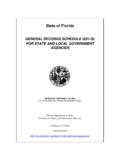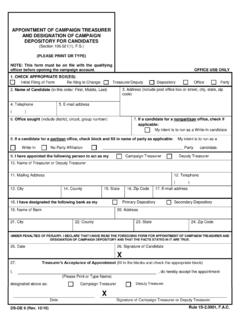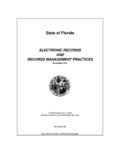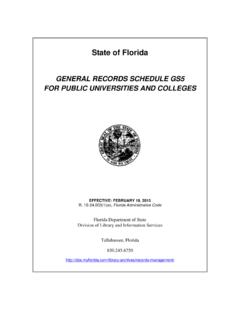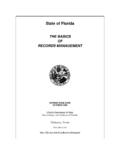Transcription of Electronic Records and Records Management Practices
1 State of Florida Electronic Records AND Records Management Practices November 2010 Florida Department of State Division of Library and Information Services State of Florida Electronic Records and Records Management Practices Table of Contents What are Public Records ? .. 4 Public Records Management , Responsibilities, and Requirements .. 5 Policies and Procedures .. 7 Managing Electronic Records .. 8 Records Inventory .. 8 Maintenance of Electronic Records and Media .. 8 Environmental Controls .. 9 Media Conversion .. 9 Managing Exempt and Confidential Public Records .. 10 Retention Requirements for Electronic Records .. 10 Destruction of Electronic Records .. 14 Electronic Communications as Public Records .. 15 Retention Requirements for Electronic Communications .. 15 E-mail Archiving .. 16 E-Discovery .. 19 Cloud Computing .. 22 Creating Electronic Records / Implementing Automated Systems.
2 24 Conduct a Cost Benefit Analysis .. 24 Incorporate Recordkeeping Requirements into System Design .. 24 Document Electronic Recordkeeping Systems .. 25 Provide Training for Users of Electronic Records .. 26 Essential Characteristics of Electronic Records and Legal Admissibility .. 27 Sustainable Formats .. 28 Selecting Storage Media .. 30 Using CDs and DVDs for Storage .. 31 File Naming .. 34 Automated Systems to Manage Electronic Records .. 35 Frequently Asked Questions (FAQ) .. 38 1.. 38 What are the requirements for scanning public Records ?2.. 38 If I scan my Records , can I get rid of the original hard copy?3.. 38 How long do we have to keep our e-mail?4.. 39 If we print out our e-mail messages, do we also have to keep them in Electronic form?5.. 39 How long do we have to keep our back-ups? Should we keep e-mail back-ups permanently in case they are ever needed?
3 6.. 40 Are postings or messages on our website, Facebook page, or Twitter site public Records ? If so, how long do we have to keep them?7.. 41 What are Florida s requirements for Electronic signatures?APPENDIX A - Department of State E-Mail Policy .. 43 APPENDIX B - Records Inventory Worksheet .. 47 APPENDIX C - Rule Florida Administrative Code .. 49 2 State of Florida Electronic Records and Records Management Practices Preface The goal of Florida s Records Management Program is to provide professional assistance to state and local government agencies in managing the Records and information required to take care of the business of government in an effective and cost-efficient manner. This is a particularly challenging goal in the 21st century. Florida public agencies generate and process information on an unprecedented scale, hastened by the rapid advance of technology.
4 This results in vast quantities of information and evolving principles of law governing the legality and admissibility of Records created or maintained by this technology. As Records and information managers, we must make every effort to keep ourselves educated and informed so that the decisions we make are consistent with law and best Practices . Florida public agencies are faced with yet another challenge. Not only must we control costs through the application of sound Records and information Management principles, but we must also apply these principles in light of the public s right to know. Chapter 119, Florida Statutes, Florida s Public Records Law, is one of the most open public Records laws in the country and a model for other states. Florida has had some form of a public Records law since 1909 and is recognized nationally for its leadership regarding public Records and accessibility to public information.
5 As we go about our business, we must remember the dual responsibility we have as public Records and information managers: to reduce government agencies costs of doing business and to guarantee the public s right to know what their government is doing. This handbook is intended to assist the creators and users of Electronic Records , information technology (IT) staff, Records Management (RM) staff, and agency managers in managing Electronic Records in an effective, cost-efficient manner that also accommodates their public Records responsibilities. The handbook emphasizes the crucial role of Records maintenance and disposition in managing Electronic Records and is designed to be used in conjunction with the Department of State s Basics of Records Management handbook. Available at , Basics provides an introduction and guide to public Records Management in Florida for state and local government agencies .
6 The principals in the Basics handbook apply equally to public Records in Electronic format. While the recommendations in this handbook reflect best Practices , they are not meant to define mandatory standards. Rule , Florida Administrative Code, provides standards for record (master) copies of public Records which reside in Electronic recordkeeping systems, establishes minimum requirements for the creation, utilization, maintenance, retention, preservation, storage, and disposition of Electronic record (master) copies, regardless of the media, and must be followed by all agencies as defined by Section (2), Florida Statutes. 3 State of Florida Electronic Records and Records Management Practices What are Public Records ? Electronic Records that meet the definition of a public record must be managed and made available according to applicable laws and rules.
7 The Florida Public Records Law, Chapter 119, Florida Statutes, defines public Records as: all documents, papers, letters, maps, books, tapes, photographs, films, sound recordings, data processing software, or other material, regardless of the physical form, characteristics, or means of transmission, made or received pursuant to law or ordinance or in connection with the transaction of official business by any agency. The Florida Supreme Court further interpreted the statutory definition to mean any material prepared in connection with official agency business which is intended to perpetuate, communicate, or formalize knowledge of some type, 1 and the courts have determined that information stored in a public agency s computer is as much a public record as a written page in a book or a tabulation in a file stored in a filing cabinet.. 2 Section (2)(a), Florida Statutes, provides that Automation of public Records must not erode the right of access to those Records .
8 As each agency increases its use of and dependence on Electronic recordkeeping, each agency must provide reasonable public access to Records electronically maintained and must ensure that exempt or confidential Records are not disclosed except as otherwise permitted by law. Therefore agencies must take steps to ensure that their Electronic Records are properly maintained and available when requested. An Electronic record is any information that is recorded in machine readable Electronic Records include numeric, graphic, audio, video, and textual information which is recorded or transmitted in analog or digital form such as Electronic spreadsheets, word processing files, databases, Electronic mail, instant messages, scanned images, digital photographs, and multimedia files. An Electronic recordkeeping system is an automated information system for the organized collection, processing, transmission, and dissemination of information in accordance with defined procedures.
9 4 1 Shevin v. Byron, Harless, Schaffer, Reid and Associates, Inc., 379 So. 2d 633 (Fla. 1980) 2 Seigle v. Barry, 422 So. 2d 63, 65 ( DCA 1982), review denied, 431 So. 2d 988 (Fla. 1983). 3 Rule (5)(e), Florida Administrative Code; Rule (3)(e), Florida Administrative Code 4 Rule (5)(f), Florida Administrative Code 4 State of Florida Electronic Records and Records Management Practices Public Records Management , Responsibilities, and Requirements Chapter 119, Florida Statutes, defines "custodian of public Records " as the elected or appointed state, county, or municipal officer charged with the responsibility of maintaining the office having public Records , or his or her designee. Responsibility for properly maintaining public Records , including Electronic Records , begins with the head of the agency.
10 Elected or appointed officials may designate others with this responsibility but, if Records are not available when they should be, it is the agency head who ultimately will have to answer for it. It is, therefore, in the agency s best interest to support the proper Management of its public Records . agencies have a variety of public Records responsibilities under Florida statute and administrative rule. Specifically: Chapter 119, Florida Statutes, requires Records custodians to allow inspection and copying of public Records except for those specifically confidential or exempt from inspection by statute. Chapter 257, Florida Statutes, requires agencies to establish and maintain an active and continuing program for the economical and efficient Management of Records . Chapters 119 and 257, Florida Statutes, as well as Rule 1B-24, Florida Administrative Code, require that agencies adhere to Records retention schedules established by the Division of Library and Information Services of the Department of State and prohibit destruction of public Records except in accordance with those retention schedules.
